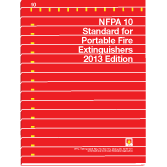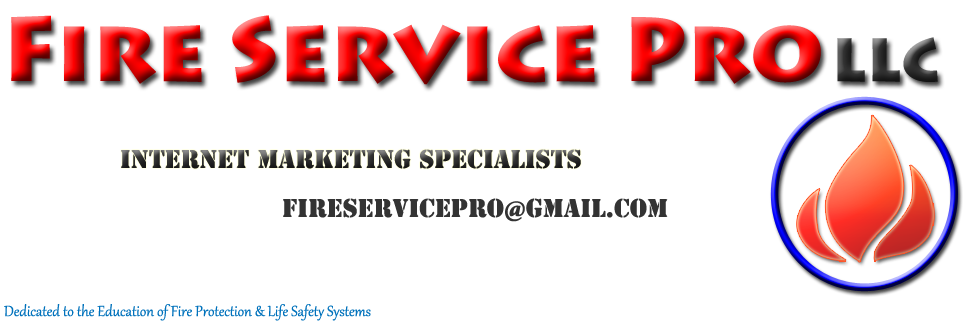Carbon Dioxide (CO2) Fire Extinguishers
Fire Extinguisher Service in Augusta, Georgia
![Aerosol Fire Suppression Systems in Augusta, Georgia]() Carbon Dioxide (CO2) fire extinguishers discharge a white cloud (snow) which smothers a fire by eliminating oxygen. Carbon Dioxide (CO2) is effective for Class B flammable liquids and is electrically non-conductive. CO2 is a clean, non-contaminating, odorless gas, safe for use on clothing, equipment, documents, or food. Carbon Dioxide (CO2) fire extinguishers discharge a white cloud (snow) which smothers a fire by eliminating oxygen. Carbon Dioxide (CO2) is effective for Class B flammable liquids and is electrically non-conductive. CO2 is a clean, non-contaminating, odorless gas, safe for use on clothing, equipment, documents, or food.
![Carbon Dioxide CO2 Fire Extinguishers in Augusta, Georgia]() Carbon dioxide (CO2) fire extinguishers are designed for installation in hospitals, laboratories, mechanical or electrical rooms, elevator shafts anywhere water may damage existing appliances or equipment specific to Class B and C fire protection in Augusta, Georgia. Carbon dioxide (CO2) fire extinguishers are designed for installation in hospitals, laboratories, mechanical or electrical rooms, elevator shafts anywhere water may damage existing appliances or equipment specific to Class B and C fire protection in Augusta, Georgia.
Carbon Dioxide (CO2) Fire Extinguisher Service in Augusta, Georgia
![Carbon Dioxide Fire Extinguisher Service in Augusta, Georgia]() Carbon dioxide (CO2) fire extinguishers should be serviced according to manufacturer specifications, Federal, OSHA, State, NFPA 10 Standard for Portable Fire Extinguishers or municipal fire code in Augusta, Georgia. [ Installation, Operating & Servicing Instructions for Hand Portable Stored Pressure Carbon Dioxide (CO2) Fire Extinguishers ] Carbon dioxide (CO2) fire extinguishers should be serviced according to manufacturer specifications, Federal, OSHA, State, NFPA 10 Standard for Portable Fire Extinguishers or municipal fire code in Augusta, Georgia. [ Installation, Operating & Servicing Instructions for Hand Portable Stored Pressure Carbon Dioxide (CO2) Fire Extinguishers ]
By shopping qualified, authorized, licensed and factory trained fire extinguisher companies in Augusta, Georgia you may obtain estimates that will detail the costs to install, service, repair, test, inspect, maintain, annual tags & certifications, (6) six year inspections, refill, recharge or replacement of carbon dioxide (CO2) portable, wheeled or fixed unit fire extinguishers.
![Hospital & Medical Facility Carbon Dioxide Fire Extinguishers in Augusta, Georgia]() Carbon Dioxide CO2 Fire Extinguishers Carbon Dioxide CO2 Fire Extinguishers
Carbon Dioxide CO2 fire extinguishers are designed to aid in fire protection specifically where the use of water could destroy electrical appliances or equipment in Augusta, Georgia. |
|
| Class B extinguishers are used on fires involving liquids, greases, and gases. Class C extinguishers are used on fires involving energized electrical equipment. |
Hospitals, Laboratories, Mechanical or Electrical Rooms, Elevator Shafts anywhere Water May Damage Existing Appliances or Equipment for Class C & C Fires. |
Class C extinguishers are used on fires involving energized electrical equipment. |
|
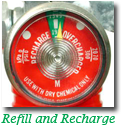
Fire extinguishers will generally have a pressure gauge to notify you when it requires a refill and recharge of the extinguishers contents so that it may be ready and operational for use to extinguish fires in Augusta, Georgia. |
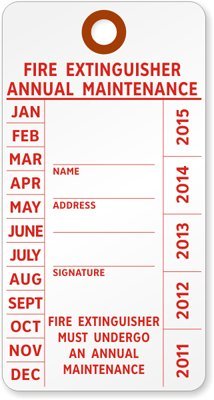
Annual inspections and certification tags should be completed by factory authorized, manufacturer certified fire extinguisher companies actively licensed in Augusta, Georgia. |
Fire Extinguishers will require service, maintenance and repair to remain fully operational at all times.
- Recharging
- Hydrostatic Tests
- Refilling
- Annual Inspections
- (6) Six Year Inspections
The services performed on installed fire extinguishers in Augusta, Georgia should be performed by actively licensed, manufacturer certified and/or NAFED certified fire extinguisher companies in Augusta, Georgia.
The additional certifications aid in determining levels of knowledge, experience and professional courtesy when deciding which fire extinguisher company you'll choose to work with. |
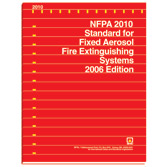
Standard for Portable Fire Extinguishers
NFPA 10
1.1* Scope. The provisions of this standard apply to the selection, installation, inspection, maintenance, and testing of portable extinguishing equipment. A.1.1 Many fires are small at origin and can be extinguished by the use of portable fire extinguishers. Notification of the fire department as soon as a fire is discovered is strongly recommended. This alarm should not be delayed by awaiting results of the application of portable fire extinguishers. Fire extinguishers can represent an important segment of any overall fire protection program. However, their successful functioning depends upon the following conditions having been met: (1) The fire extinguisher is located in accordance with the requirements of Chapter 6 and is in working order. (2) The fire extinguisher is of the correct type for a fire that can occur. (3) The fire is discovered while still small enough for the fire extinguisher to be effective. (4) The fire is discovered by a person ready, willing, and able to use the fire extinguisher. Fixed systems are covered by the following NFPA standards: (1) NFPA 11, Standard for Low-, Medium-, and High-Expansion Foam (2) NFPA 12, Standard on Carbon Dioxide Extinguishing Systems (3) NFPA 12A, Standard on Halon 1301 Fire Extinguishing Systems (4) NFPA 13, Standard for the Installation of Sprinkler Systems (5) NFPA 14, Standard for the Installation of Standpipe and Hose Systems (6) NFPA 15, Standard for Water Spray Fixed Systems for Fire Protection (7) NFPA 16, Standard for the Installation of Foam-Water Sprinkler and Foam-Water Spray Systems (8) NFPA 17, Standard for Dry Chemical Extinguishing Systems (9) NFPA 17A, Standard for Wet Chemical Extinguishing Systems (10) NFPA 96, Standard for Ventilation Control and Fire Protection of Commercial Cooking Operations (11) NFPA 750, Standard on Water Mist Fire Protection Systems (12) NFPA 2001, Standard on Clean Agent Fire Extinguishing Systems 1.1.1 Portable fire extinguishers are intended as a first line of defense to cope with fires of limited size. 1.1.2 The selection and installation of extinguishers is independent of whether the building is equipped with automatic sprinklers, standpipe and hose, or other fixed protection equipment. (See 5.5.5, 6.1.1.1, 6.2.1.1, and 6.2.1.5.) 1.1.3 The requirements given herein are minimum. 1.1.4 The requirements do not apply to permanently installed systems for fire extinguishment, even where portions of such systems are portable (such as hose and nozzles attached to a fixed supply of extinguishing agent). |
Portable, wheeled or fixed unit fire extinguishers are an invaluable tool that every occupied building should install and properly service aiding in the containment, suppression or extinguishing of small fires in Augusta, Georgia.






